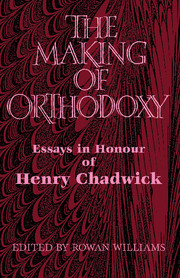Book contents
- Frontmatter
- Contents
- Preface
- List of abbreviations
- Bibliography of Henry Chadwick
- Does it make sense to speak of pre-Nicene orthodoxy?
- ‘And I have other sheep’ – John 10:16
- Reason and the rule of faith in the second century ad
- Adam in Origen
- Panegyric, history and hagiography in Eusebius' Life of Constantine
- Matthew 28:19, Eusebius, and the lex orandi
- The achievement of orthodoxy in the fourth century ad
- Eunomius: hair-splitting dialectician or defender of the accessibility of salvation?
- Some sources used in the De Trinitate ascribed to Didymus the Blind
- The rhetorical schools and their influence on patristic exegesis
- Pelagianism in the East
- The legacy of Pelagius: orthodoxy, heresy and conciliation
- Augustine and millenarianism
- Divine simplicity as a problem for orthodoxy
- The origins of monasticism
- Artistic idiom and doctrinal development
- Index of modern names
- Index of ancient and medieval names
- Index of sources
The rhetorical schools and their influence on patristic exegesis
Published online by Cambridge University Press: 08 October 2009
- Frontmatter
- Contents
- Preface
- List of abbreviations
- Bibliography of Henry Chadwick
- Does it make sense to speak of pre-Nicene orthodoxy?
- ‘And I have other sheep’ – John 10:16
- Reason and the rule of faith in the second century ad
- Adam in Origen
- Panegyric, history and hagiography in Eusebius' Life of Constantine
- Matthew 28:19, Eusebius, and the lex orandi
- The achievement of orthodoxy in the fourth century ad
- Eunomius: hair-splitting dialectician or defender of the accessibility of salvation?
- Some sources used in the De Trinitate ascribed to Didymus the Blind
- The rhetorical schools and their influence on patristic exegesis
- Pelagianism in the East
- The legacy of Pelagius: orthodoxy, heresy and conciliation
- Augustine and millenarianism
- Divine simplicity as a problem for orthodoxy
- The origins of monasticism
- Artistic idiom and doctrinal development
- Index of modern names
- Index of ancient and medieval names
- Index of sources
Summary
To honour Henry Chadwick is to honour the great tradition of British scholarship to which Edwin Hatch belonged. The work of Edwin Hatch was the inspiration of this paper, and it may be regarded as a celebration of the centenary of the publication of his Hibbert lectures of 1888, as well as a tribute to one who, like him, has achieved international acclaim for his erudition.
Some of what Hatch pioneered in those lectures on The Influence of Greek Ideas on Christianity has become commonplace, but not all. It was the content of the first three lectures which provided the starting point of this study, those on Greek education and its legacy, on the influence of Greek methods of exegesis on Christian exegesis, and on the debt Christian preaching owed to Greek rhetoric.
By the Christian era, there was long established a system of education based upon the study of literature and practical exercises in speech-making. As Hatch explained, literature from the distant past was powerful speech preserved from a Golden Age, which could act as a model for those who produced literary exercises to be declaimed. The teaching of the grammaticus and the rhetor in each city's gymnasium was the principal agent for the spread of Hellenistic culture throughout the then known world, and for its ongoing transmission through approximately 800 years.
Hatch stressed the hold the educational system had upon the society into which Christianity came, and showed how inevitably it would affect the emerging church.
- Type
- Chapter
- Information
- The Making of OrthodoxyEssays in Honour of Henry Chadwick, pp. 182 - 199Publisher: Cambridge University PressPrint publication year: 1989
- 31
- Cited by



